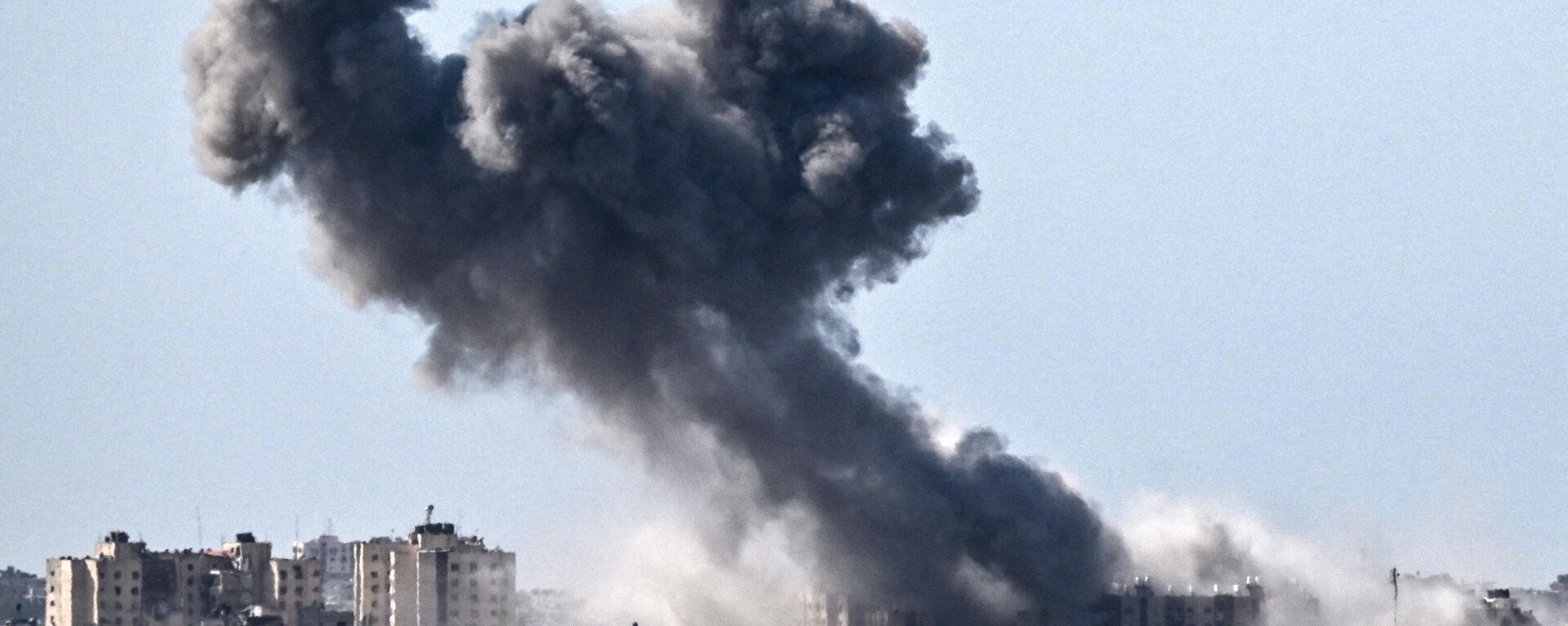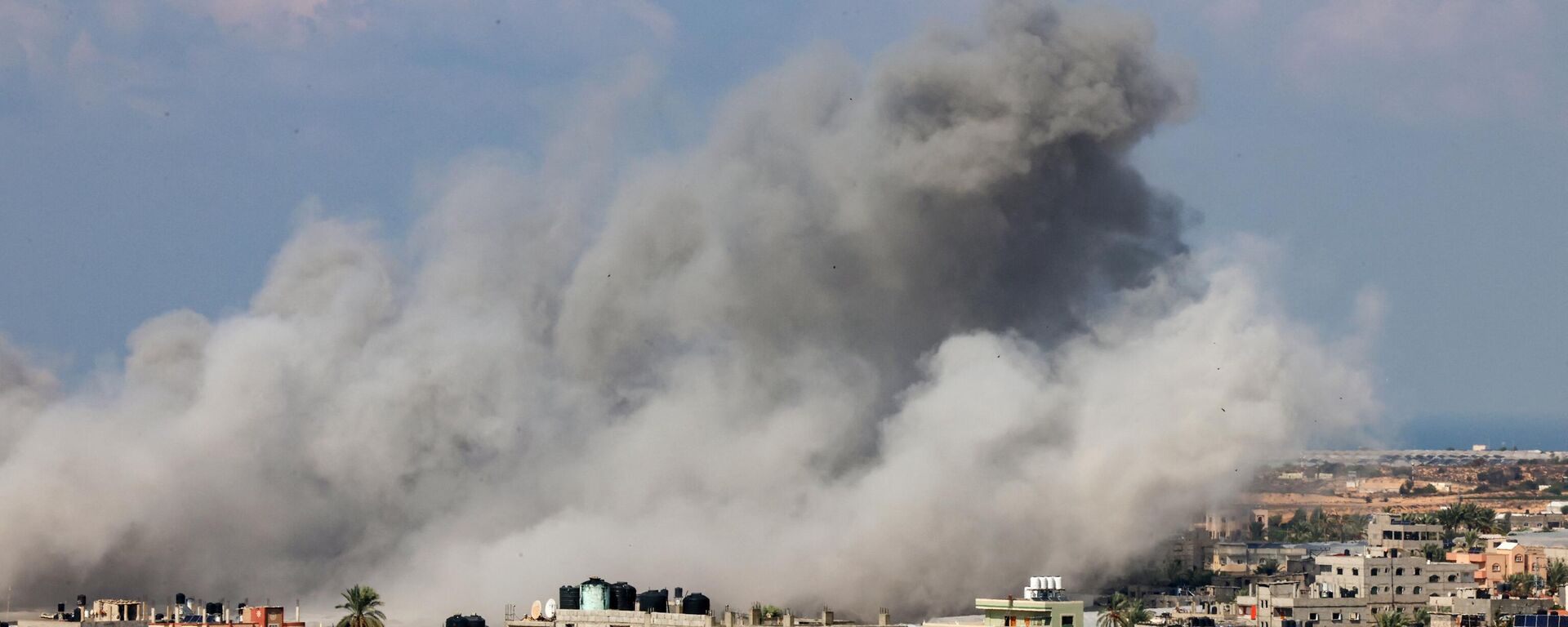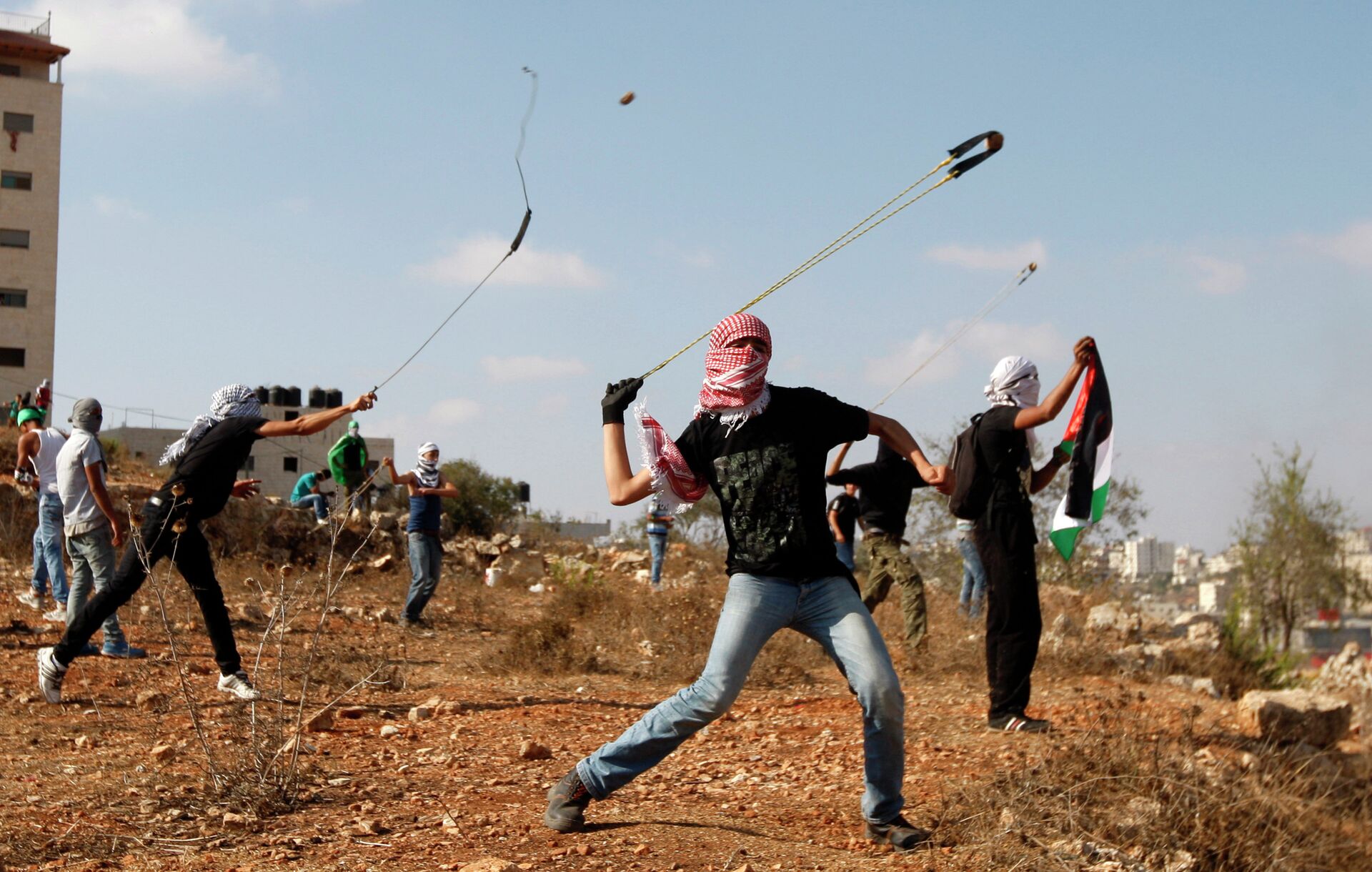https://sputnikglobe.com/20231030/how-netanyahu-strengthened-hamas-to-discredit-palestinian-cause-1114586501.html
How Netanyahu Strengthened Hamas to Discredit Palestinian Cause
How Netanyahu Strengthened Hamas to Discredit Palestinian Cause
Sputnik International
Netanyahu has vowed to destroy Hamas as Israeli Defense Forces intensify their assault on Gaza, but the hardline prime minister has continuously supported the armed group in an effort to divide and discredit the Palestinian cause.
2023-10-30T03:01+0000
2023-10-30T03:01+0000
2023-12-05T09:23+0000
sputnik explains
benjamin netanyahu
palestinians
west bank
palestine
popular front for the liberation of palestine (pflp)
zionism
hamas
middle east
gaza strip
https://cdn1.img.sputnikglobe.com/img/07e7/07/0f/1111896335_0:0:1655:932_1920x0_80_0_0_26f65cc27c09fd866eac85b59819175d.jpg
“Our heroic troops have one supreme goal: to completely defeat the murderous enemy and to guarantee our existence in this country,” declared Israeli Prime Minister Benjamin Netanyahu in a televised address Saturday evening.The speech took on a near-messianic tone, replete with references to the Biblical triumphs of the Jewish people that could’ve been aimed at religious Israelis or Christian Zionists alike. The rhetoric was typical of Netanyahu, who has repeatedly promised to “destroy Hamas” in the weeks since the armed group’s surprise October 7 attack on Israeli police and military installations.But Hamas has served as an historically useful tool over the years for the populist prime minister as he’s sought to consolidate support and tighten Israel’s grip on occupied Palestinian territory. Here, Sputnik offers a brief explainer on the symbiotic relationship between the controversial prime minister and the armed Islamist group.Palestinian PoliticsSince the country’s official founding in 1948, all sides of Israel’s political spectrum have been dominated by Zionism, the ideology proclaiming Jews’ transcendent right to a state in the territory between the Jordan River and the Mediterranean Sea.In response, displaced Palestinians have rallied behind nationalist parties declaring their right to return to their historic homeland under international law. In the Israeli-occupied West Bank the most popular Palestinian force is currently Fatah, a secular, social democratic party seen as somewhat of a moderating force in the conflict. Another popular party is the Popular Front for the Liberation of Palestine (PFLP), a revolutionary socialist party advocating for a one-state solution.Israel was alarmed by the success of the initiative, and began looking for ways to undermine global solidarity for the Palestinians. Around the same time, Palestinian radicals began turning to violent force in their struggle against Israeli aggression.Extreme MeasuresAs Israeli occupation intensified after the Six-Day War, some Palestinians began to increasingly adopt violent tactics. A series of aircraft hijackings took place in the late 1960s and 1970s, as well as suicide bombing attacks in Israeli cities. The violence culminated in two periods of intensified attacks: The First Intifada, lasting from 1987 to 1993, and the Second Intifada, lasting from 2000 until 2005.The attacks shocked Israeli society but provided an excuse to delay Palestinian statehood or any peaceful settlement of the conflict. Additionally, Palestinians found themselves facing greater political isolation with the dissolution of the Soviet Union. Many of them devoted themselves fully to armed struggle, both within Israel and in neighboring countries via groups like Hezbollah in Lebanon.It was in this desperate environment that the political and military group Hamas emerged in the late 1980s.In contrast to the secular Fatah and PFLP, Hamas is an explicitly Islamist group. The political party began to gain support in Palestinian society for their provision of social services and leadership of armed resistance. However, international support for the Palestinian cause was damaged as the United States, the UK, and other Western powers designated Hamas as a terrorist organization, a label that increasingly stigmatized supporters of Palestinian liberation, especially after the September 11, 2001 terrorist attacks.The deeply polarizing nature of Hamas and their tactics began to be recognized as politically useful by certain enterprising figures in Israeli politics.Netanyahu Chooses His Enemy“Netanyahu and Hamas are political partners,” declared a recent article in the Israeli newspaper Haaretz, “and both sides have fulfilled their side of the bargain.”The article goes on to document some of the ways Netanyahu has materially supported the armed group during his over 16 years as Israeli prime minister, including allowing untraceable cash contributions to Hamas from Iran and Qatar. In the latter country, Hamas’ leader Ismail Haniyeh is allowed to operate freely. Israel tightly controls who and what is allowed to enter into Gaza, but the Qatari envoy is permitted to arrive with suitcases of cash to fund Hamas’ operations.The Israeli government often argues Hamas invests money in building military capability rather than providing social services in Gaza. The free flow of funds to the group, overseen and approved by Israel’s hands-off approach, ensures that this continues. Netanyahu retains his useful talking point demonizing the terrorist threat while Hamas periodically rebuilds its capability to wage war, providing justification for Netanyahu’s hardline approach.In case the politically symbiotic relationship weren’t clear, Netanyahu made it explicit during a meeting with members of his Likud party in 2019: “Anyone who wants to thwart the establishment of a Palestinian state has to support the bolstering of Hamas and transferring money to Hamas. This is part of our strategy, to isolate the Palestinians in Gaza from the Palestinians in the West Bank.”A Symbiotic RelationshipHamas cemented their rule in Gaza in 2006 after winning a plurality of votes during an election among Palestinians that year. The electoral triumph is often put forward as an excuse for collective punishment of Palestinian civilians, although given that around half of Gaza’s population is under 18, most Gazans were not able to vote in Palestinians’ last election to date, much less vote for Hamas.Hamas’ institution of effective one-party, authoritarian control over the Gaza Strip succeeded in helping Netanyahu make the Palestinian cause synonymous with Hamas’ Islamist jihadic vision. It also provided a useful political punching bag for the Israeli right and a periodic target for the Israeli military: Netanyahu launched an invasion of Gaza in 2014, then as now promising to eliminate Hamas. The military campaign provided Netanyahu with a political boost while Hamas slowly arose from the ashes, becoming more militant than ever before.The rivalry has polarized Israeli society as well as Hamas’ periodic launching of crude rockets helps solidify public perception of Palestinians as a threat. The zeitgeist was aptly demonstrated in 2021 when Neftali Bennett, a purportedly moderate opposition figure who briefly dislodged Netanyahu from his role as prime minister, recalled his time in the Israeli military by proclaiming, “I've killed lots of Arabs in my life and there's no problem with that.”The political opportunism of the moment has become clear in recent days, as a report from an Israeli think tank as well as leaked analysis from Israeli intelligence agencies have noted the “rare opportunity” for the country to finally clear Palestinians from Gaza and annex the territory amidst the reaction to Hamas’ October 7 attack. Viewed through this lens, Israel’s attempted evacuation of the northern half of the Gaza Strip may be seen as a way to gradually colonize the enclave, while proposed “humanitarian relocation” of Gazans to Egypt or elsewhere would serve to clear the territory as a whole.Hajo Meyer, a noted Jewish Holocaust survivor from Auschwitz, spent the final years of his life comparing Israel’s treatment of Palestinians to that of the Nazis towards Jews. Yeshayahu Leibowitz, an Orthodox Jewish public intellectual in Israel, similarly lamented the ongoing demonization of Palestinians, warning that the country would eventually succumb to “Judeo-Nazism” if the trend continued.With all 2.3 million residents of Gaza now in extreme danger, many observers worry that day has now come. With at least 2 million Arabs killed in 21st-century US-led intervention in the Middle East, Arabs may now be seen as modern-day Jews, their deaths met with widespread indifference in Western society. So far US President Joe Biden has appeared to give his Israeli allies carte blanche in handling their “national security” matters as Netanyahu ominously threatens to “change the Middle East.”
https://sputnikglobe.com/20231029/nearly-impossible-retired-us-general-says-israel-unlikely-to-achieve-stated-aim-in-gaza-1114584818.html
https://sputnikglobe.com/20231016/netanyahu-evokes-nazism-to-justify-israels-colossal-response-to-hamas-attack-1114239142.html
west bank
palestine
gaza strip
Sputnik International
feedback@sputniknews.com
+74956456601
MIA „Rossiya Segodnya“
2023
Sputnik International
feedback@sputniknews.com
+74956456601
MIA „Rossiya Segodnya“
News
en_EN
Sputnik International
feedback@sputniknews.com
+74956456601
MIA „Rossiya Segodnya“
Sputnik International
feedback@sputniknews.com
+74956456601
MIA „Rossiya Segodnya“
benjamin netanyahu, hamas, palestine-israel conflict,
benjamin netanyahu, hamas, palestine-israel conflict,
How Netanyahu Strengthened Hamas to Discredit Palestinian Cause
03:01 GMT 30.10.2023 (Updated: 09:23 GMT 05.12.2023) Netanyahu has vowed to destroy Hamas as Israeli Defense Forces intensify their assault on Gaza, but the hardline prime minister has continuously supported the armed group in an effort to divide and discredit the Palestinian cause.
“Our heroic troops have one supreme goal: to completely defeat the murderous enemy and to guarantee our existence in this country,”
declared Israeli Prime Minister Benjamin Netanyahu in a televised address Saturday evening.
The speech took on a near-messianic tone, replete with references to the Biblical triumphs of the Jewish people that could’ve been aimed at religious Israelis or Christian Zionists alike. The rhetoric was typical of Netanyahu, who has repeatedly promised to “destroy Hamas” in the weeks since the armed group’s surprise October 7 attack on Israeli police and military installations.
But Hamas has served as an historically useful tool over the years for the populist prime minister as he’s sought to consolidate support and tighten Israel’s grip on occupied Palestinian territory. Here, Sputnik offers a brief explainer on the symbiotic relationship between the controversial prime minister and the armed Islamist group.
Since the country’s official founding in 1948, all sides of Israel’s political spectrum have been dominated by Zionism, the ideology proclaiming Jews’ transcendent right to a state in the territory between the Jordan River and the Mediterranean Sea.
In response, displaced Palestinians have rallied behind nationalist parties declaring their right to return to their historic homeland under international law. In the Israeli-occupied West Bank the most popular Palestinian force is currently Fatah, a secular, social democratic party seen as somewhat of a moderating force in the conflict. Another popular party is the Popular Front for the Liberation of Palestine (PFLP), a revolutionary socialist party advocating for a one-state solution.
In previous decades, left-wing forces like the PFLP began to rally significant international support behind the Palestinian cause, especially within the Eastern Bloc. This culminated in 1975 with the successful adoption of United Nations General Assembly Resolution 3379, an initiative led by the Soviet Union declaring that “Zionism is a form of racism and racial discrimination.”
Israel was alarmed by the success of the initiative, and began looking for ways to undermine global solidarity for the Palestinians. Around the same time, Palestinian radicals began turning to violent force in their struggle against Israeli aggression.
As Israeli occupation intensified after the Six-Day War, some Palestinians began to increasingly adopt violent tactics. A series of aircraft hijackings took place in the late 1960s and 1970s, as well as suicide bombing attacks in Israeli cities. The violence culminated in two periods of intensified attacks: The First Intifada, lasting from 1987 to 1993, and the Second Intifada, lasting from 2000 until 2005.
The attacks shocked Israeli society but provided an excuse to delay Palestinian statehood or any peaceful settlement of the conflict. Additionally, Palestinians found themselves facing greater political isolation with the dissolution of the Soviet Union. Many of them devoted themselves fully to armed struggle, both within Israel and in neighboring countries via groups like Hezbollah in Lebanon.
It was in this desperate environment that the political and military group Hamas emerged in the late 1980s.
In contrast to the secular Fatah and PFLP, Hamas is an explicitly Islamist group. The political party began to gain support in Palestinian society for their provision of social services and leadership of armed resistance. However, international support for the Palestinian cause was damaged as
the United States,
the UK, and other Western powers designated Hamas as a terrorist organization, a label that increasingly stigmatized supporters of Palestinian liberation, especially after the September 11, 2001 terrorist attacks.
The deeply polarizing nature of Hamas and their tactics began to be recognized as politically useful by certain enterprising figures in Israeli politics.
Netanyahu Chooses His Enemy
“Netanyahu and Hamas are political partners,” declared
a recent article in the Israeli newspaper Haaretz, “and both sides have fulfilled their side of the bargain.”
The article goes on to document some of the ways Netanyahu has materially supported the armed group during his over 16 years as Israeli prime minister, including allowing untraceable cash contributions to Hamas from Iran and Qatar. In the latter country, Hamas’ leader Ismail Haniyeh is allowed to operate freely. Israel tightly controls who and what is allowed to enter into Gaza, but the Qatari envoy is permitted to arrive with
suitcases of cash to fund Hamas’ operations.

29 October 2023, 21:35 GMT
The Israeli government often argues Hamas invests money in building military capability rather than providing social services in Gaza. The free flow of funds to the group, overseen and approved by Israel’s hands-off approach, ensures that this continues. Netanyahu retains his useful talking point demonizing the terrorist threat while Hamas periodically rebuilds its capability to wage war, providing justification for Netanyahu’s hardline approach.
“Netanyahu is the one who turned Hamas from a terror organization with few resources into a semi-state body,” noted Haaretz, emphasizing that the group’s rule in Gaza politically isolates Palestinians in the enclave from those in the West Bank.
In case the politically symbiotic relationship weren’t clear, Netanyahu
made it explicit during a meeting with members of his Likud party in 2019:
“Anyone who wants to thwart the establishment of a Palestinian state has to support the bolstering of Hamas and transferring money to Hamas. This is part of our strategy, to isolate the Palestinians in Gaza from the Palestinians in the West Bank.”Hamas cemented their rule in Gaza in 2006 after winning a plurality of votes during an election among Palestinians that year. The electoral triumph is often put forward as an excuse for collective punishment of Palestinian civilians, although given that
around half of Gaza’s population is under 18, most Gazans were not able to vote in Palestinians’ last election to date, much less vote for Hamas.
Hamas’ institution of effective one-party, authoritarian control over the Gaza Strip succeeded in helping Netanyahu make the Palestinian cause synonymous with Hamas’ Islamist jihadic vision. It also provided a useful political punching bag for the Israeli right and a periodic target for the Israeli military:
Netanyahu launched an invasion of Gaza in 2014, then as now promising to eliminate Hamas. The military campaign provided Netanyahu with a political boost while Hamas slowly arose from the ashes, becoming more militant than ever before.The rivalry has polarized Israeli society as well as Hamas’ periodic launching of crude rockets helps solidify public perception of Palestinians as a threat. The zeitgeist was aptly demonstrated in 2021 when Neftali Bennett, a purportedly moderate opposition figure who briefly dislodged Netanyahu from his role as prime minister,
recalled his time in the Israeli military by proclaiming, “I've killed lots of Arabs in my life and there's no problem with that.”
The political opportunism of the moment has become clear in recent days, as a report from an Israeli think tank as well as leaked analysis from Israeli intelligence agencies have
noted the “rare opportunity” for the country to finally clear Palestinians from Gaza and annex the territory amidst the reaction to Hamas’ October 7 attack. Viewed through this lens, Israel’s attempted evacuation of the northern half of the Gaza Strip may be seen as a way to gradually colonize the enclave, while proposed “humanitarian relocation” of Gazans to Egypt or elsewhere would serve to clear the territory as a whole.

16 October 2023, 20:17 GMT
Hajo Meyer, a noted Jewish Holocaust survivor from Auschwitz, spent the final years of his life comparing Israel’s treatment of Palestinians to that of the Nazis towards Jews. Yeshayahu Leibowitz, an Orthodox Jewish public intellectual in Israel, similarly lamented the ongoing demonization of Palestinians, warning that the country would eventually succumb to “Judeo-Nazism” if the trend continued. With all 2.3 million residents of Gaza now in extreme danger, many observers worry that day has now come. With at least 2 million Arabs killed in 21st-century US-led intervention in the Middle East, Arabs may now be seen as modern-day Jews, their deaths met with widespread indifference in Western society. So far US President Joe Biden has appeared to give his Israeli allies carte blanche in handling their “national security” matters as Netanyahu
ominously threatens to “change the Middle East.”




